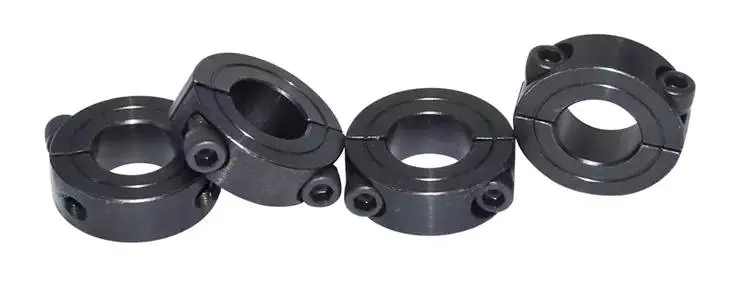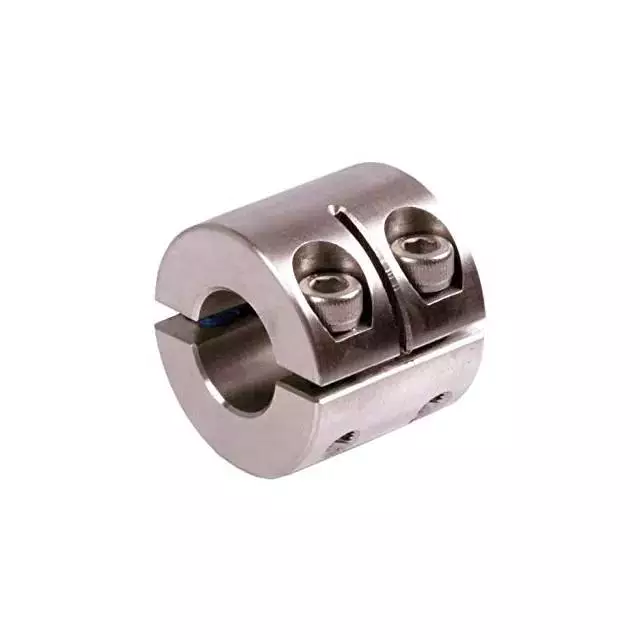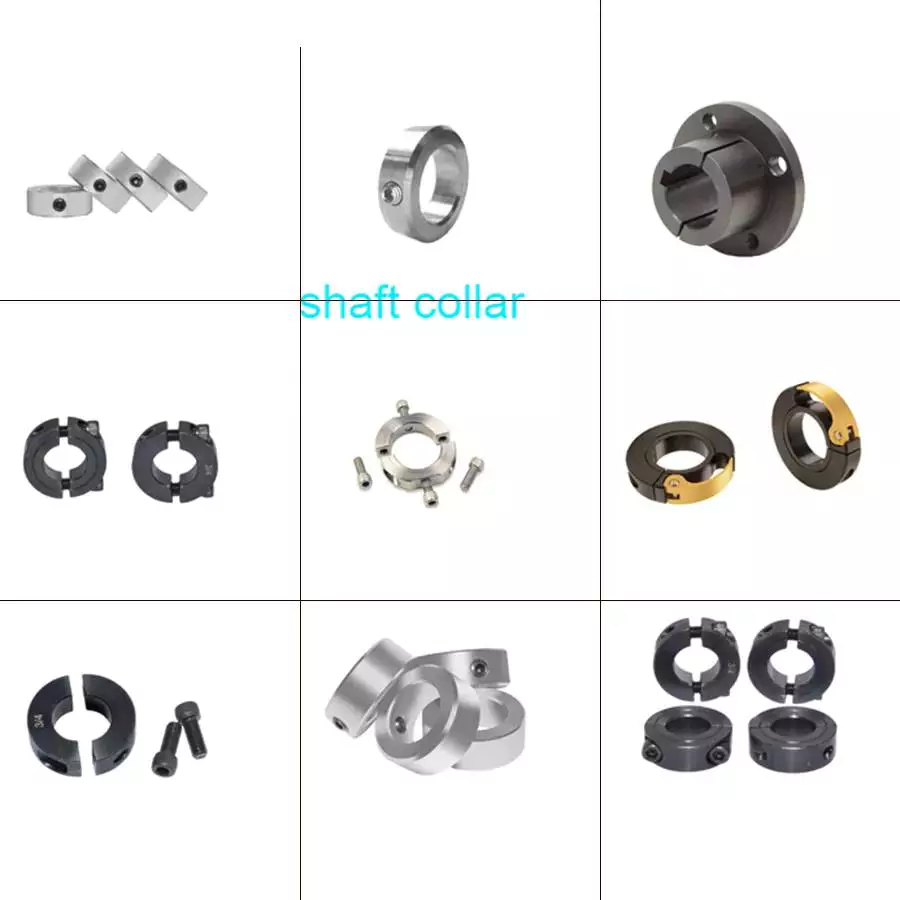
What are the temperature and corrosion resistance properties of shaft collars?
The temperature and corrosion resistance properties of shaft collars vary depending on the materials they are made of. Different materials exhibit different levels of resistance to temperature extremes and corrosion. Here are some commonly used materials for shaft collars and their temperature and corrosion resistance properties:
- Steel: Steel shaft collars, particularly those made from stainless steel, offer excellent temperature and corrosion resistance properties. Stainless steel is known for its high strength, durability, and resistance to rust and corrosion. It can withstand a wide range of temperatures, from low cryogenic temperatures to high heat environments. Stainless steel shaft collars are often used in applications where exposure to moisture, chemicals, or harsh environments is a concern.
- Aluminum: Aluminum shaft collars have good temperature resistance properties and can handle moderate temperature ranges. They are lightweight and offer reasonable corrosion resistance. However, aluminum is not as corrosion-resistant as stainless steel and may be susceptible to certain chemicals or highly corrosive environments. Aluminum shaft collars are commonly used in applications where weight reduction is a priority, such as aerospace or automotive industries.
- Plastic: Plastic shaft collars, such as those made from nylon or acetal, have limited temperature resistance compared to steel or aluminum. They can typically handle moderate temperatures but may deform or degrade at higher temperatures. Plastic collars are not as resistant to corrosion as metal collars but can still offer good resistance to certain chemicals and environmental conditions. Plastic collars are often used in applications where weight, cost, or electrical insulation properties are important factors.
- Brass: Brass shaft collars offer good temperature resistance and moderate corrosion resistance. They can handle a range of temperatures and are often used in applications where a combination of durability, conductivity, and aesthetics is required. Brass collars may tarnish over time but can still maintain their functionality and structural integrity.
It is important to note that the temperature and corrosion resistance properties of shaft collars can also be influenced by factors such as the specific alloy composition, surface treatments, and environmental conditions they are exposed to. When selecting shaft collars for your application, it is crucial to consider the temperature range and potential exposure to corrosive substances or environments. Consulting with manufacturers, reviewing technical specifications, and considering industry standards or guidelines can help ensure that you choose shaft collars with appropriate temperature and corrosion resistance properties for your specific needs.

Where can I find information on the materials used in manufacturing shaft collars?
If you are looking for information on the materials used in manufacturing shaft collars, there are several sources where you can find relevant information. Here are some common resources to consider:
- Manufacturer Websites: Many manufacturers of shaft collars provide detailed information about the materials they use in their product specifications or technical datasheets. Visiting the websites of specific collar manufacturers and exploring their product documentation or resources section can help you find information about the materials used in their collars. This information may include the type of material (such as steel, stainless steel, aluminum, or plastic) and any specific properties or characteristics associated with the material.
- Product Catalogs and Brochures: Manufacturers often publish product catalogs or brochures that provide an overview of their collar offerings. These catalogs may include information about the materials used in manufacturing the collars. You can request catalogs from manufacturers directly or check their websites for downloadable versions. The catalogs may highlight the material properties and advantages of using specific materials for different applications.
- Material Databases: Online material databases or directories can be valuable resources for finding information about specific materials used in manufacturing shaft collars. These databases typically provide comprehensive information about various materials, including their composition, mechanical properties, corrosion resistance, temperature tolerance, and other relevant characteristics. Examples of such databases include MatWeb, Engineering Toolbox, or specialized materials databases maintained by industry organizations or universities.
- Technical Standards and Specifications: Technical standards and specifications related to mechanical components can often include information about the materials used in their construction. Standards organizations or industry associations may release documents that outline the material requirements for shaft collars or provide guidelines for material selection. Accessing these standards or specifications can provide insights into the recommended materials for shaft collar manufacturing.
- Consulting with Manufacturers or Suppliers: If you have specific questions about the materials used in manufacturing shaft collars, reaching out directly to manufacturers or suppliers can be beneficial. They can provide detailed information about the materials they use, including their composition, properties, and any specific treatments or coatings applied to enhance performance. Contacting manufacturers or suppliers allows for direct communication and the opportunity to address any specific concerns or requirements you may have.
When seeking information on materials used in shaft collar manufacturing, it is important to consider factors such as desired properties (e.g., strength, corrosion resistance), environmental compatibility, and application-specific requirements. This will help you make informed decisions about selecting shaft collars that are suitable for your specific needs and operating conditions.

Can I find reviews on popular brands of shaft collars for user feedback?
Yes, it is possible to find reviews on popular brands of shaft collars to gain user feedback and insights. Here are some sources where you can look for reviews:
- Online Retailers: Online retailers such as Amazon, eBay, and industrial supply websites often feature customer reviews and ratings for products, including shaft collars. You can visit the product pages of specific brands or models of shaft collars and read user reviews to get an idea of their performance, quality, and user satisfaction. These reviews are typically provided by customers who have purchased and used the products, offering valuable feedback based on their experiences.
- Industrial Forums and Communities: Online industrial forums, discussion boards, or communities dedicated to mechanical components and equipment can be a valuable resource for finding user feedback on different brands of shaft collars. Participating in these communities and posting specific inquiries about certain brands or models can help you connect with industry professionals, engineers, or users who have firsthand experience with specific shaft collar brands. They can provide insights, recommendations, and share their opinions or experiences to assist you in making an informed decision.
- Manufacturer Websites: Some manufacturers maintain customer review sections or testimonials on their websites. Visiting the websites of popular shaft collar brands and exploring their product pages or customer support sections may provide access to reviews or feedback from users who have used their specific products. Manufacturer websites often include case studies, application examples, or testimonials that can give you an idea of the performance and user satisfaction associated with their shaft collars.
- Professional Publications and Magazines: Professional publications, trade magazines, or industry-specific journals related to mechanical engineering, industrial equipment, or power transmission may feature product reviews or evaluations. These publications often conduct independent tests, assessments, or interviews with professionals in the field to provide objective insights and feedback on various products, including shaft collars. Checking these publications or their online platforms can give you access to expert opinions and evaluations.
- Social Media and Online Groups: Social media platforms like LinkedIn or Facebook may have industry-specific groups or communities where professionals and enthusiasts discuss mechanical components and equipment. Joining these groups and engaging in conversations can help you connect with individuals who can provide feedback or recommendations based on their experiences with different brands of shaft collars.
When reading reviews, it’s important to consider multiple sources and evaluate the overall consensus rather than relying solely on individual opinions. Look for patterns, common experiences, and consider the credibility of the sources providing the reviews. Keep in mind that user feedback can vary, and personal preferences or specific application requirements may influence opinions. By gathering insights from various sources, you can make a more informed decision about the popular brands of shaft collars and their suitability for your specific needs.


editor by CX 2024-02-08